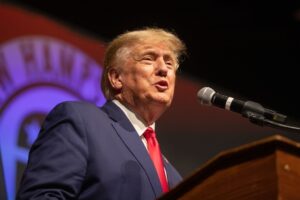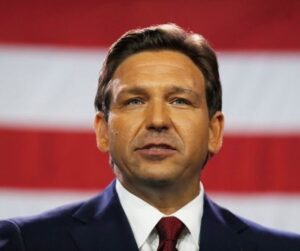Florida Gov. Ron DeSantis on March 13 made hurricane-level waves within the Republican Party by declaring that defending Ukraine is not a “vital” US national interest. DeSantis’s stance puts him squarely at odds with GOP congressional leadership and party insiders. But more importantly, it further cements what his strategy will be should he pursue an expected run for the 2024 Republican presidential nomination. It is a political path that comes with decided potential pitfalls.
Rattling Republican Cages in DC
“While the U.S. has many vital national interests – securing our borders, addressing the crisis of readiness within our military, achieving energy security and independence, and checking the economic, cultural, and military power of the Chinese Communist Party – becoming further entangled in a territorial dispute between Ukraine and Russia is not one of them,” DeSantis wrote in reply to a questionnaire Fox News host Tucker Carlson posed to prospective GOP White House aspirants. The blowback from Hill Republicans was immediate and fierce.
“I’m disturbed by it. I think he’s a smart guy,” Sen. John Cornyn (R-TX) told Politico. “I want to find out more about it, but I hope he feels like he doesn’t need to take that Tucker Carlson line to be competitive in the primary. It’s important for us to continue to support Ukrainians for our own security.”
“I completely disagree with his comments,” a horrified Sen. Roger Wicker (R-MS) exclaimed. “I take them at face value, they were written and submitted, not off the cuff.”
DeSantis has seen his national profile surge in recent years due to his wildly successful job performance in Florida, one of the most solid red states in the nation. His anti-woke agenda has made him a hit with America First supporters. As a governor, he has not had to wade in on foreign policy controversies. But a presidential candidate, of course, must do so. DeSantis’s record as a House member from 2013-2018 suggests he would be more or less in synch with conventional GOP interventionist beliefs. Yet, in his first major foreign policy statement of the 2024 election cycle, here he is firmly rejecting the most cherished position of Republican hawks in Washington.
DeSantis Danger Zone

Ron DeSantis (Photo by Octavio Jones/Getty Images)
DeSantis fully realizes establishment anger is not going to ding his popularity with Republican grassroots voters in the slightest. Quite the opposite. But there is a danger to the path to the nomination he is carving out for himself. Whether fair or not, DeSantis is opening himself up to accusations that he is the second coming of Sen. Ted Cruz (R-TX) circa 2015, who rather transparently attempted to position himself in the early stages of his run for the 2016 GOP presidential nod as a friendly fellow-fighter in the Donald Trump mode while quietly laying the ground to eventually be seen as the only palatable option to the unruly populist outsider left standing.
DeSantis’s potential 2024 rivals, including Trump himself, have already seized on this.
The governor is “following what I am saying. It is a flip-flop. He was totally different. Whatever I want, he wants,” Trump said in dismissing DeSantis’s Ukraine remarks.
Former South Carolina governor Nikki Haley, who has already announced her candidacy, agreed. “President Trump is right when he says Governor DeSantis is copying him – first in his style, then on entitlement reform, and now on Ukraine,” Haley asserted. “Republicans deserve a choice, not an echo.”
This could prove harmful. DeSantis does not want to do anything to ruffle the feathers of Trump’s still-formidable America First base. His Ukraine statement must be seen first and foremost in this light. But being labeled as a Trump Echo would encourage a disastrous public framing of DeSantis as second banana to the towering Trump. This would become most striking on a nationally televised debate stage.

Donald Trump (Photo by Scott Eisen/Getty Images)
While he brought other glaring negatives to the table that DeSantis does not, this was the fatal misperception that helped derail Cruz in 2016. The notion that resoundingly anti-establishment Trump backers would desire a less hard-boiled version of the real thing is every bit as untrue today as it was eight years ago. Words like “insurrectionist,” “extremist” and whatever else the dominant political and media ranks may care to throw at Trump only make his supporters more enamored with him. Ted Cruz knew this in 2015. Ron DeSantis knows it today.
That being so, to present oneself as the socially acceptable similarly flavored alternative is to passively align with the deeply insulting narrative (to Trump backers) that a watered-down Trump is required in the first place. It is most definitely not the way to appease the red hats.
It’s an interesting conundrum. DeSantis must find a way to separate himself from Trump while still doing nothing to upset the voters who so strongly identify with the 45th president. His Ukraine comments reveal what he is not willing to do. But how will Ron DeSantis show GOP voters that he is more than just a second-hand version of their favorite show?
Do you have an opinion about this article? We’d love to hear it! If you send your comments to [email protected], we might even publish your edited remarks in our new feature, LN Readers Speak Out. Remember to include the title of the article along with your name, city, and state.
Please respect our republishing guidelines. Republication permission does not equal site endorsement. Click here.

